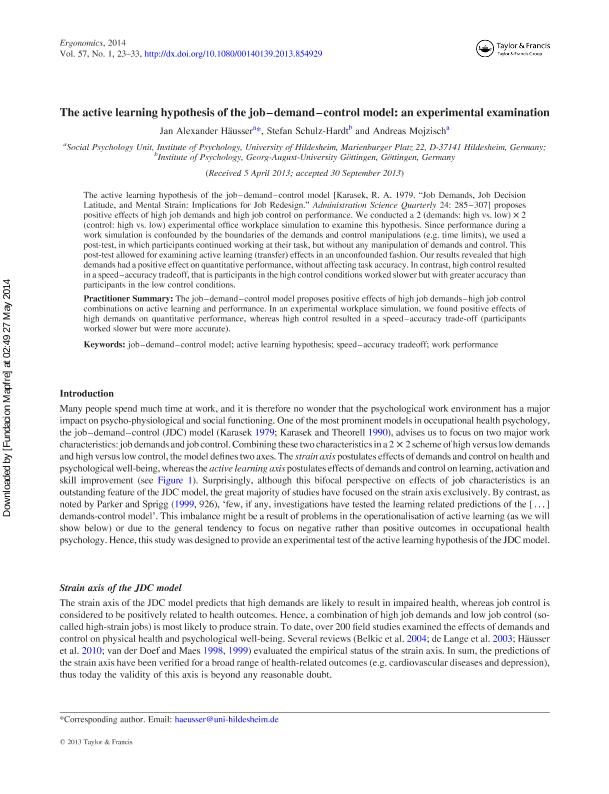The Active learning hypothesis of the job-demand-control model : an experimental examination

Contenido multimedia no disponible por derechos de autor o por acceso restringido. Contacte con la institución para más información.
| Tag | 1 | 2 | Valor |
|---|---|---|---|
| LDR | 00000cab a2200000 4500 | ||
| 001 | MAP20140019007 | ||
| 003 | MAP | ||
| 005 | 20140530130416.0 | ||
| 008 | 140527e20140106esp|||p |0|||b|spa d | ||
| 040 | $aMAP$bspa$dMAP | ||
| 084 | $a875 | ||
| 100 | 1 | $0MAPA20140009350$aHäusser, Jan Alexander | |
| 245 | 1 | 4 | $aThe Active learning hypothesis of the job-demand-control model$b: an experimental examination$cJan Alexander Häusser, Stefan Schulz-Hardt, Andreas Mojzisch |
| 520 | $aThe active learning hypothesis of the jobdemandcontrol model [Karasek, R. A. 1979. Job Demands, Job Decision Latitude, and Mental Strain: Implications for Job Redesign. Administration Science Quarterly 24: 285307] proposes positive effects of high job demands and high job control on performance. We conducted a 2 (demands: high vs. low) × 2 (control: high vs. low) experimental office workplace simulation to examine this hypothesis. Since performance during a work simulation is confounded by the boundaries of the demands and control manipulations (e.g. time limits), we used a post-test, in which participants continued working at their task, but without any manipulation of demands and control. This post-test allowed for examining active learning (transfer) effects in an unconfounded fashion. Our results revealed that high demands had a positive effect on quantitative performance, without affecting task accuracy. In contrast, high control resulted in a speedaccuracy tradeoff, that is participants in the high control conditions worked slower but with greater accuracy than participants in the low control conditions. | ||
| 773 | 0 | $wMAP20100019818$tErgonomics : the international journal of research and practice in human factors and ergonomics$dOxon [United Kingdom] : Taylor & Francis, 2010-$x0014-0139$g06/01/2014 Volumen 57 Número 1 - enero 2014 |

